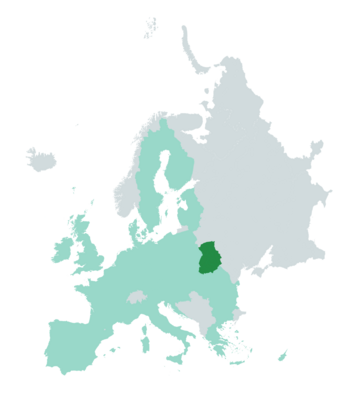Bastarneia
Kingdom of Bastarneia Kuniggareiki Bastjanaland | |
|---|---|
| Motto: Hilpa Fraujins jah lubo þiudos sind meina mahts. "The Lord's help and the love of the people are my strength" | |
 Location of Bastarneia (green) within European Union (light green) and Europe (gray) | |
| Location | Eastern Europe |
| Capital and largest city | Laimbairgs |
| Official languages | Bastarneian |
| Recognised national languages | Russian |
| Recognised regional languages | Hungarian |
| Ethnic groups (2014) | 83.7% Bastarneian 8.3% Russian 3.1% Ukrainian 2.8% Polish 1.7% Hungarian 0.1% Jewish 0.3% other |
| Religion | 57.0% Eastern Orthodoxy 30.9% Greek Catholicism 4.3% Simply Christianity 3.9% Protestantism 1.6% Roman Catholicism 0.2% Judaism 2.1% non-religious or other |
| Demonym(s) | Bastarneian |
| Government | Unitary parliamentary constitutional monarchy |
• Monarch | Hereswith |
| Dagamers Alaþius | |
| Legislature | Alaþing |
| Formation | |
• Monarchy established | c. 830 AD |
| 869 | |
| 987 | |
• Absorption into Lithuania | 1362 |
• Austrian crown land | 1772 |
| 15 December 1917 | |
| 2 August 1940 | |
• Independence from the Soviet Union | 27 August 1991 |
• Constitution adopted | 29 July 1994 |
| Area | |
• Total | 131,256 km2 (50,678 sq mi) (95th) |
• Water (%) | 1.4 |
| Population | |
• 2019 estimate | 9,765,281 (92nd) |
• 2001 census | 10,101,756 |
• Density | 76.96/km2 (199.3/sq mi) (105th) |
| GDP (PPP) | 2019 estimate |
• Total | $102.010 billion (83rd) |
• Per capita | $10,098 (107th) |
| GDP (nominal) | 2019 estimate |
• Total | $33.721 billion (98th) |
• Per capita | $3,338 (124th) |
| Gini (2014) | 25.0 low (19th) |
| HDI (2017) | high (88th) |
| Currency | Shilling (Sk) (KBS) |
| Time zone | UTC+2 (EET) |
• Summer (DST) | UTC+3 (EEST) |
| Driving side | right |
| Calling code | +384 |
| ISO 3166 code | KB |
| Internet TLD | .kb |
This article is incomplete because it is pending further input from participants, or it is a work-in-progress by one author. Please comment on this article's talk page to share your input, comments and questions. Note: To contribute to this article, you may need to seek help from the author(s) of this page. |
Bastarneia (Bastarneian: Bastjanaland, pronounced: [basˈtjanaland]), officially the Kingdom of Bastarneia (Bastarneian: Kuniggareiki Bastjanaland, pronounced: [kʊnʲɪŋgaˈrʲi:kʲɪ basˈtjanaland]), is a landlocked country in Eastern Europe, bordered by Ukraine to the east, Moldova and Romania to the south, Hungary to the southwest, Slovakia and Poland to the west, and Belarus to the north. Its capital and most populous city is Laimbairgs. The nation's geography is defined largely by its central uplands and by the Polesian lowland in the north, while in the far west the Carpathian mountains rise sharply. Beyond the mountains, a small portion of the Pannonian basin also falls within Bastarneian territory. Until the 20th century, different states at various times controlled the lands of modern-day Bastarneia, including the Principality of Bastarneia, the Polish–Lithuanian Commonwealth, the Austro-Hungarian Empire, and the Soviet Union.
In the aftermath of the 1917 Russian Revolution, Bastarneia declared independence as the Kingdom of Bastarneia, and aided Poland during the Polish–Soviet War of 1919—1921. During the second world war, the Soviet Union and Axis Powers invaded, dividing the territory between them; during the course of the war, military operations devastated Bastarneia, which lost about a third of its population and more than half of its economic resources. Following the war, Bastarneia was redeveloped as a Soviet Republic. The parliament of the republic proclaimed the sovereignty of the Bastarneian SSR on 27 July 1990, and during the dissolution of the Soviet Union, Bastarneia declared independence on 27 August 1991. In July of 1994 the Constitution of Bastarneia was adopted, which reestablished the Ancient Monarchy by inviting an obscure member of the Danish royal family, Count Berthold of Rosenborg, to take the throne.
Following its independence, Bastarneia declared itself a neutral state; it formed a limited military partnership with Russia and other CIS countries while also establishing a partnership with NATO in 1994. On 1 July 2013, Bastarneia entered into the European Union alongside Croatia.
Bastarneia is a developing country and ranks 88th on the Human Development Index. It has the second lowest GDP per capita in Europe after Moldova and falls shortly behind neighbouring Ukraine. The nation suffers from a high rate of poverty and severe corruption; however, because of its fertile farmlands, it is one of the world's largest exporters of grain. The country is home to a multi-ethnic population, 83.7 percent of whom are Bastarneians, followed by a very large Russian minority, as well as Ukrainians, Poles, Hungarians, and many others. Bastarneia is a unitary parliamentary constitutional monarchy.